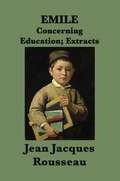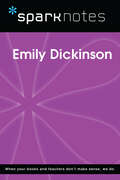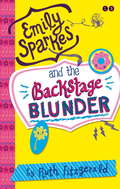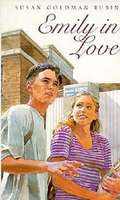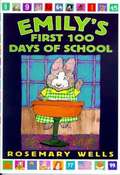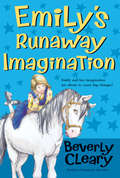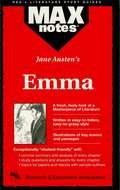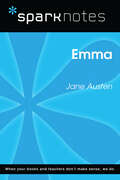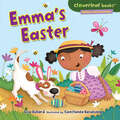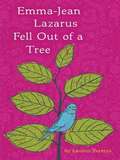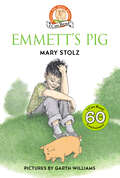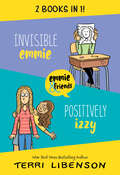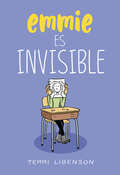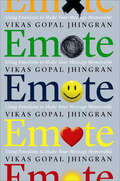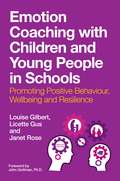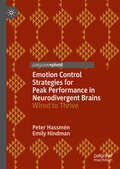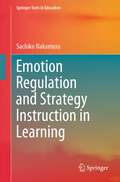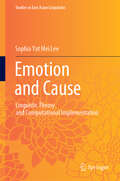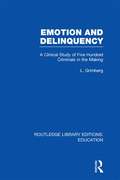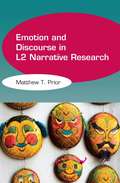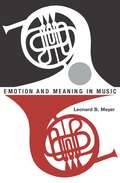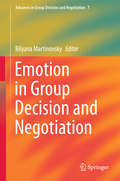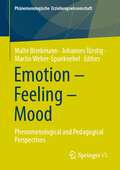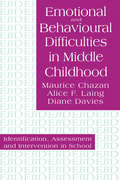- Table View
- List View
Emile or Concerning Education
by Jean Jacques Rousseauémile, or On Education is a treatise on the nature of education and on the nature of man written by Jean-Jacques Rousseau, who considered it to be the "best and most important of all my writings." Due to a section of the book entitled "Profession of Faith of the Savoyard Vicar," émile was banned in Paris and Geneva and was publicly burned in 1762. During the French Revolution, émile served as the inspiration for what became a new national system of education.
Emily Dickinson (SparkNotes Biography Guide)
by SparkNotesEmily Dickinson (SparkNotes Biography Guide) Making the reading experience fun! SparkNotes Biography Guides examine the lives of historical luminaries, from Alexander the Great to Virginia Woolf. Each biography guide includes:An examination of the historical context in which the person lived A summary of the person&’s life and achievements A glossary of important terms, people, and events An in-depth look at the key epochs in the person&’s career Study questions and essay topics A review test Suggestions for further reading Whether you&’re a student of history or just a student cramming for a history exam, SparkNotes Biography guides are a reliable, thorough, and readable resource.
Emily Sparkes and the Backstage Blunder: Book 4 (Emily Sparkes #4)
by Ruth FitzgeraldJoin Emily Sparkes for laugh-out-loud observations about life, parents and how to handle the grossest boys in the universe! Perfect for fans of Cathy Cassidy and Dork Diaries, the first Emily book has been shortlisted for the Scholastic Laugh Out Loud Book Award (The Lollies).'Lots of fun and a really cool read!' - Cathy CassidyIt's school play season and Emily Sparkes has landed herself a starring role . . . not. In fact, it's the most humiliating role in the history of all time - even worse than the time she was cast as a duck. (Quack, quack.)Emily's friends Chloe (pretty much a Hollywood-star-to-be, daahling) and Zuzanna are very excited. Partly because, for the first time ever, they'll be performing in a gala at the local theatre like proper actors!But things take a turn for the worse when they meet the other school who'll be performing. The girls from Mag Hall have a history with Chloe that seems a bit mysterious. It's going to take some real Emily Sparkes creativityness to get to the bottom of things!
Emily in Love
by Susan Goldman-RubinWhen Emily Gold sees Hunt in the school yard her first day of "regular" school, she hopes he'll be her boyfriend. Pretty Emily, who is developmentally disabled, wants more than anything else to fit in. Will Hunt like her even though she's not like the other kids?
Emily's First 100 Days of School
by Rosemary WellsFrom the book: On the first day of school I leave my mama's arms. I am too excited to cry. Emily is ready for her first day of school. There's so much to do: learning the alphabet, singing, reading books, dancing, and counting, starting with the very first day. "When we reach one hundred days, we will have a big party," says Miss Cribbage. One hundred days feels very far away, but day by day, Emily and her classmates see they're getting closer. And as the lessons they learn begin to add up, their world expands. Emily's First 100 Days of School is a celebration of the joy of learning. Supported by a vital community of family, friends, neighbors, and teachers, a child develops her own rhythm and timing for exploring the wonders of the world around her.
Emily's Runaway Imagination
by Beverly Cleary Tracy DockrayCan imaginative Emily make her biggest dream come true?<P><P> Spunky Emily Bartlett lives in an old farmhouse in Pitchfork, Oregon'at a time when automobiles are brand-new inventions and libraries are a luxury few small towns can afford. Her runaway imagination leads her to bleach a horse, hold a very scary sleepover, and feed the hogs an unusual treat. But can she use her lively mind to help bring a library to Pitchfork?<P> Adventure is pretty scarce in Pitchfork, Oregon. So why shouldn't Emily bleach Dad's old plow horse or try some of her other ideas?
Emma (MAXNotes Literature Guides)
by Jean HartREA's MAXnotes for Jane Austen's Emma MAXnotes offer a fresh look at masterpieces of literature, presented in a lively and interesting fashion. Written by literary experts who currently teach the subject, MAXnotes will enhance your understanding and enjoyment of the work. MAXnotes are designed to stimulate independent thought about the literary work by raising various issues and thought-provoking ideas and questions. MAXnotes cover the essentials of what one should know about each work, including an overall summary, character lists, an explanation and discussion of the plot, the work's historical context, illustrations to convey the mood of the work, and a biography of the author. Each chapter is individually summarized and analyzed, and has study questions and answers.
Emma (SparkNotes Literature Guide Series)
by SparkNotesEmma (SparkNotes Literature Guide) by Jane Austen Making the reading experience fun! Created by Harvard students for students everywhere, SparkNotes is a new breed of study guide: smarter, better, faster.Geared to what today's students need to know, SparkNotes provides:chapter-by-chapter analysis explanations of key themes, motifs, and symbols a review quiz and essay topics Lively and accessible, these guides are perfect for late-night studying and writing papers.
Emma Jean Lazarus Fell in Love
by Lauren TarshisEmma-Jean is experiencing something new and unsettling, but not entirely unpleasant. It's a fluttering in her heart when she imagines herself asking Will to the seventh-grade dance. Her best friend Colleen is worried that Will might laugh if Emma-Jean invites him. After all, Emma-Jean is a different kind of girl-certainly different from queen-bee Laura, who has always made it clear that Will is hers. Maybe Colleen can distract Emma- Jean from this risky plan by recruiting her for a top-secret investigation. You see, Colleen has an anonymous admirer, and if Emma-Jean can help her figure out who he is, then Colleen could ask him to the dance. Even more endearing and genuine than its predecessor, this companion to the award-winning Emma-Jean Lazarus Fell Out of a Tree steals your heart and inspires a smile that lasts as long as the novel itself. . . and longer.
Emma's Easter (Cloverleaf Books (tm) -- Holidays And Special Days Ser.)
by Lisa Bullard Constanza BasaluzzoEmma's family is celebrating Easter! Emma and her little brother hunt for Easter eggs and candy. They go to church. Then relatives come over for a big meal. Find out the different ways people celebrate this special day!
Emma-Jean Lazarus Fell Out of a Tree
by Lauren TarshisFrom a debut author comes a heart-warming novel about a unique girl and her seventhgrade experiences. Emma-Jean Lazarus is the smartest and strangest girl at William Gladstone Middle School. Her classmates don?t understand her, but that?s okay because Emma-Jean doesn?t quite get them either. But one afternoon, all that changes when she sees Colleen Pomerantz crying in the girl?s room. It is through Colleen that Emma-Jean gets a glimpse into what it is really like to be a seventh grader. And what she finds will send her tumbling out of a tree and questioning why she ever got involved in the first place.
Emmett's Pig (I Can Read Level 2)
by Mary StolzA sweet story for anyone who's ever dreamed of having a pet pigEmmett loves pigs and has all the toy pigs any kid could dream of. But Emmett wants a real pig. He lives in a New York City apartment, so Emmett’s family says that he can’t keep one in the house. Instead, on his birthday, his dreams will come true in the most surprising way!This Level Two I Can Read book is geared for kids who read on their own but still need a little help.This digital edition of the classic Emmett’s Pig by Mary Stolz and Garth William is a special commemorative edition celebrating the 60th anniversary of I Can Read books for beginning readers. The book features an anniversary burst and eight pages of bonus material on the history of I Can Read—including a timeline, origin stories of favorite characters, and never-before-seen early sketches.
Emmie & Friends 2-Book Collection: Invisible Emmie, Positively Izzy (Emmie & Friends)
by Terri LibensonTwo full-color illustrated graphic novels—Invisible Emmie and Positively Izzy—from award-winning and New York Times bestselling author and cartoonist Terri Libenson! A great gift for the middle school graphic novel fan in your life.“Clever, funny work by a great cartoonist.”—Stephan Pastis, author of Timmy Failure“Plenty of laughs and tons of heart. Unforgettable!”—Lincoln Peirce, author of Big NateCrushes. Drama. MIDDLE SCHOOL.Invisible Emmie is the story of quiet, shy, artistic Emmie and popular, outgoing, athletic Katie, and how their lives unexpectedly intersect one day, when an embarrassing note falls into the wrong hands. . . .In Positively Izzy, we meet Bri, the brain, and Izzy, the dreamer. On the day of the school talent show, the girls’ lives converge in ways more dramatic than either of them could have imagined.Plus don't miss Terri Libenson's other popular graphic novels, including:Just JaimeBecoming BriannaTruly TylerRemarkably RubySurprisingly Sarah
Emmie es invisible
by Terri LibensonUna maravillosa historia sobre el poder de la amistad.Una novela gráfica que te robará el corazón. Emmie es creativa, alegre pero extremadamente tímida. Katie es muy popular, algo atolondrada y llena de energía. Emmie y Katie son muy diferentes pero, cuando una notita secreta cae en las manos equivocadas, verán cómo sus vidas se unen y cambian para siempre. Todos los enamoramientos, humillaciones, aburrimientos y pequeños grandes dramas que sufrimos a los doce años, están concentradosen un solo y sorprendente día en esta extraordinaria novela gráfica sobre la amistad, la autoestima, la empatía y el compañerismo. Porque todos nos hemos sentido invisibles alguna vez... Reseña:«Una emotiva novela gráfica sobre el poder de la superación con fuertes dosis de humor. Emmie es cualquiera que se haya sentido invisible alguna vez; una fascinante caja de sorpresas.»Ana Punset, autora de El club de las Zapatillas Rojas
Emote: Using Emotions to Make Your Message Memorable
by Vikas Gopal JhingranA self-proclaimed introvert turned Toastmaster Champion reveals how to infuse your message with emotions to improve your public speaking skills.Many people fear public speaking more than death. Most wish they could do it better, or at least avoid the sweating, stuttering jitters that plague them before any presentation. Vikas Jhingran has been there. He was so poor at speaking in public that his supervisor wouldn’t let him make presentations to clients—even when he had done all the work. When he tried to improve his skills by studying professional speakers, he was surprised to discover that few presenters understood speech making at a fundamental level. Their overly prescriptive approach often confused the speech and the tools that are used to deliver it. What listeners are most engaged by are the emotions that go with your message. By focusing on this important aspect of communication—the transfer of emotion—this guide to successful communication:Develops an emotion-driven approach that will help you deliver a powerful, effective message. Encourages introverts and non-native speakers to find their voices and deliver impactful speeches. Clarifies the roles of common speaking tools and shows how to use them effectively.In Emote, Vikas presents an emotion-based approach that will change the way you think about verbal communications, helping you gain the confidence you need to stand in the spotlight, create connections, and get your message across to anyone.“Emote approaches verbal communications from a very human perspective. It will help you improve verbally, whether public speaking or in one-on-one conversations.” —Nancy Duarte, author of Resonate
Emotion Coaching with Children and Young People in Schools: Promoting Positive Behavior, Wellbeing and Resilience
by Janet Rose Louise Gilbert Licette GusEmotion Coaching (EC) is a universal communication strategy which supports children and young people to self-regulate and manage their stress responses. Originally noticed as an effective way parents communicated with their children around challenging behaviours, Emotion Coaching has been shown to be highly successful in educational settings too. This is why the authors pioneered the research and application of Emotion Coaching into UK (primary and secondary) schools and community settings. The book includes straightforward descriptions and practical tips, with signposting to resources, case studies and vignettes to illustrate its practical application in educational settings. It supports adults to promote empathetic responses to challenging behaviours and situations, helping children and young people to understand their emotions and learn to manage them and their behavior in the longer-term.
Emotion Control Strategies for Peak Performance in Neurodivergent Brains: Wired to Thrive (Global Perspectives in Applied Sport and Performance Psychology)
by Peter Hassmén Emily HindmanThis unique book shows how traits and emotional patterns, often seen as barriers, can be transformed into powerful assets for success. Through fascinating case studies and science-backed strategies, readers learn to regulate emotions, build emotional resilience, sharpen focus, and achieve personal and professional excellence. Each chapter delivers practical tools for strengthening emotional regulation, addressing negative thinking, and improving adaptability. Core theories–including Maslow&’s hierarchy of needs, Csikszentmihalyi&’s flow, and Hanin&’s individual zone of optimal functioning–are brought to life through real-world examples, making complex ideas accessible and actionable. Promoting a neurodiversity-affirming approach, the book invites readers to move beyond deficit thinking and unlock the full potential of individual strengths. Structured reflection, measurable progress tracking, and tailored environment design are essential to long-term performance and wellbeing. Whether you are an athlete, entrepreneur, healthcare professional, academic, or leader, this book challenges you to redefine success. Excellence is not about perfection or <span lang="EN-GB" style="font-family: 'Calibri',sans-serif; mso-ascii-theme-font: minor-latin; mso-hansi-th
Emotion Regulation and Strategy Instruction in Learning (Springer Texts in Education)
by Sachiko NakamuraThis textbook is written for teachers, practitioners, and researchers, who are interested in developing their knowledge about emotions and learning about ways of helping their learners to cultivate positive and cope with negative emotions. The book covers the topics of emotions, emotion regulation, strategies, and instruction. Each topic is discussed in the subsequent chapters, beginning with a concise summary of theories and research in the fields of psychology, education, and language learning. This is followed by its practical applications in the classroom, with suggestions and ideas based on research as well as reports from teachers in a wide range of contexts. Teachers’ vignettes give readers an opportunity to compare their experiences with others. A practical guide with detailed steps for implementing strategy instruction in emotion regulation is provided at the end.
Emotion and Cause: Linguistic Theory and Computational Implementation (Studies in East Asian Linguistics)
by Sophia Yat LeeThis work argues that cause events, being the most tangible component of emotion, provide a rich dimension of how emotions should be classified. While it is often claimed that emotional concepts cannot be defined, this work views emotion as a response triggered by actual or perceived events, specifically focusing on the interaction between five primary emotions (Happiness, Sadness, Fear, Anger, and Surprise) and cause events. Cause events are examined in terms of two dimensions, namely transitivity and epistemicity. By incorporating the semantic and syntactic information of emotion cause events, this representation of emotion not only provides deep linguistic criteria of emotion cause events, but also offers an event-based approach to emotion classification. A text-driven, rule-based system for detecting the causes of emotion is then developed to establish the validity of the proposed linguistic model for emotion detection and classification. The system shows promising results.
Emotion and Delinquency: A Clinical Study of Five Hundred Criminals in the Making (Routledge Library Editions: Education)
by L GrimbergInevitably a product of the time in which it was published this book discusses important questions of neuro-psychology as well as setting out the early ‘nature versus nurture’ debate. The author also argues for changes in the care and education of those with learning difficulties to enable them to lead fulfilling lives, rather than being incarcerated in institutions (as was routinely the case in 1928).
Emotion and Discourse in L2 Narrative Research
by Matthew T. PriorThis interdisciplinary book explores the interactional construction and management of emotionality in second language autobiographical interview research. By advancing a discursive constructionist approach, it offers a timely methodological and interaction-based perspective that examines how emotionality is collaboratively managed as both topic and resource within the institutional and interpersonal business of qualitative research. The book weaves together discussions based on first and second language literature as well as original research with adult immigrants from Southeast Asia living in the US and Canada. This book will be of interest to those researching second and foreign language studies, applied linguistics and related bilingual and multilingual research, as well as those interested in qualitative research methods and emotion.
Emotion and Meaning in Music
by Leonard B. Meyer"Altogether it is a book that should be required reading for any student of music, be he composer, performer, or theorist. It clears the air of many confused notions . . . and lays the groundwork for exhaustive study of the basic problem of music theory and aesthetics, the relationship between pattern and meaning."—David Kraehenbuehl, Journal of Music Theory "This is the best study of its kind to have come to the attention of this reviewer."—Jules Wolffers, The Christian Science Monitor "It is not too much to say that his approach provides a basis for the meaningful discussion of emotion and meaning in all art."—David P. McAllester, American Anthropologist "A book which should be read by all who want deeper insights into music listening, performing, and composing."—Marcus G. Raskin, Chicago Review
Emotion in Group Decision and Negotiation
by Bilyana MartinovskyThe volume offers an exploration of methods for analysis of emotion in negotiation, such as cognitive modeling, discourse analysis, all testing, subsequent multidimensional scaling, impression rating, and graph modeling for conflict resolution, reasonable and unreasonable disagreement. It covers activities, such as business negotiation, conflict solving, bargaining, task management meetings, discussions, and elaborates on different kinds of emotions. Some emotions stimulate negotiation (e. g. empathy), others -hinder it (e. g. disgust). However, all emotions open a door to uncertainty in relations and negotiation, which in turn provides an opportunity. The volume views language in negotiation not only as a vehicle for transmission of thought but also as a manifestation of emotion and the ethical.
Emotion – Feeling – Mood: Phenomenological and Pedagogical Perspectives (Phänomenologische Erziehungswissenschaft #12)
by Malte Brinkmann Johannes Türstig Martin Weber-SpanknebelThis volume provides systematic, interdisciplinary, and intercultural impulses for a phenomenological pedagogy of emotions, feelings, and moods without subordinating them to the logocentric dualism of emotion and rationality. Starting from foundational and cultural perspectives on pedagogical relations of education, learning, and Bildung, specific emotions in individual studies, as well as different approaches of important representatives of phenomenological research on emotions are presented. The contributions include pedagogical, philosophical, and empirical approaches to feelings, emotions, and moods, highlighting their fundamental importance and productivity for learning, Bildung, and education in different pedagogical institutions and fields.
Emotional And Behavioural Difficulties In Middle Childhood: Identification, Assessment And Intervention In School
by Diane Davies Maurice Chazan Alice F. LaingLooking In Depth At The Main Issues Of Emotional And Behavioural difficulties of 7-11 year olds, this book draws on recent study material and projects to suggest practical ways of dealing with such difficulties in schools, and to give a clearer understanding of the problems posed by children with EBDs. Key topics covered include educating children with Emotional And Behavioural Difficulties Ebds In Mainstream And Special schools, disruptive behaviour and bullying, withdrawal, anxiety and depression, identification and assessment and how schools, parents and others can help.
